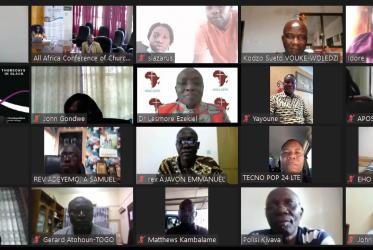Displaying 1 - 20 of 36
WCC applauds Nobel Prize winner Narges Mohammadi
06 October 2023
COVID-19 in conflict zones: “a crisis within another crisis”
27 November 2020
New student body at Bossey Ecumenical Institute “a source of joy”
14 September 2020
Young Africans are eager to grapple with challenges
09 January 2020
Young people in Togo: “Hear our voice! We want to tell our stories!”
07 November 2019
Dr Saïd Ailabouni: God is on the side of rejected, oppressed, occupied
12 September 2019
Knowledge of gender roles deepens in Togo
03 June 2019
Paving the way for ecumenical studies, learning English in Bossey
24 September 2018
Bishop Younan receives ‘Bridges of Understanding’ award
14 September 2018














